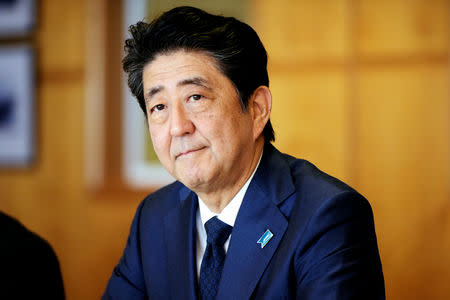South Korea risks ties by disbanding "comfort women" fund - Japan PM

TOKYO/SEOUL (Reuters) - Japanese Prime Minister Shinzo Abe on Wednesday warned South Korea it risked damaging ties by disbanding a fund meant to settle compensation for South Korean women forced to work in Japanese military brothels during World War Two.
"If international pledges are broken then forging ties between countries becomes impossible and as a member of the international community we urge South Korea to act responsibly," Abe told reporters at his residence in Tokyo.
Under a 2015 deal, Japan apologised to the "comfort women" -- Japan's euphemism for Asian women, many of them Korean, forced to work in its wartime brothels. Tokyo provided a 1 billion yen (now $9.4 million) fund to help them.
On Wednesday, South Korea's Ministry of Gender Equality and Family said it planned to dissolve the Reconciliation and Healing Foundation after consulting with victims, their advocates and related agencies.
"We will make utmost efforts to carry out policy that can help the victims recover their honour and dignity," Minister Jin Sun-mee said in a statement.
The two countries share a bitter history that includes Japan's 1910-45 colonisation of the Korean peninsula.
Abe's government had hoped the "comfort women" agreement would settle a hot-button issue that is a major obstacle to better relations. But South Korea's Foreign Minister Kang Kyung-wha said in January the agreement did not meet victims' demands.
The South Korean ministry said it will manage the balance of the fund, which at the end of October stood at 16.08 billion won ($14.21 million), including Seoul's contributions.
The new row comes after South Korea's top court last month ruled that Japan's Nippon Steel & Sumitomo Metal Corp must compensate four South Koreans for their forced wartime labour.
Japan denounced that judgement as "unthinkable," saying that South Korea had waived all such claims in a 1965 pact under which Japan agreed to provide grants and loans to help spur South Korea's economic development.
South Korea says nearly 5,000 victims of wartime forced labour are still alive, from a total of nearly 150,000 who were forced help the Japanese war effort by working in factories and mines in Japan.
A South Korean appeals court is expected to deliver its ruling in another case against Mitsubishi Heavy Industries in December.
($1 = 112.9000 yen)
($1 = 1,131.2400 won)
(Reporting by Tim Kelly in TOKYO and Hyonhee Shin in SEOUL; additional reporting by Joyce Lee; editing by Darren Schuettler)

